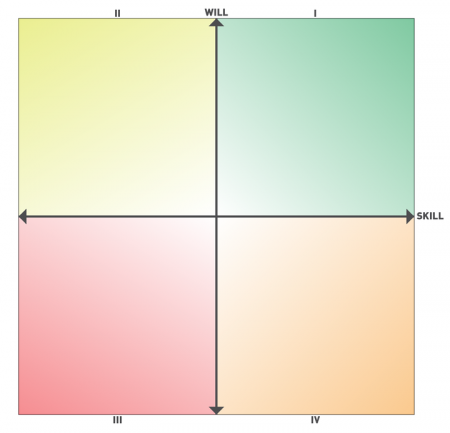This is part 2 in the “Skill vs. Will Sales Coaching Series.” Read part 1 here.
Before you can pull the right strings to coach up your team, you need to recognize your players. Looking at their skill vs. will makeup can help in determining what approaches to take with sales coaching and how you want to structure your team. In the next part of this three-part blog post, we’ll look at how to actually motivate people — but first, let’s take a look at the personas for each quadrant of the skill vs. will matrix that we discussed in part 1.
Recognizing Your Players
“Champions aren’t made in gyms. Champions are made from something they have deep inside them — a desire, a dream, a vision. They have to have the skill, and the will. But the will must be stronger than the skill.” -Muhammad Ali
Sales Quadrant I
Quadrant I are the champs. They walk, talk and win like a champ.

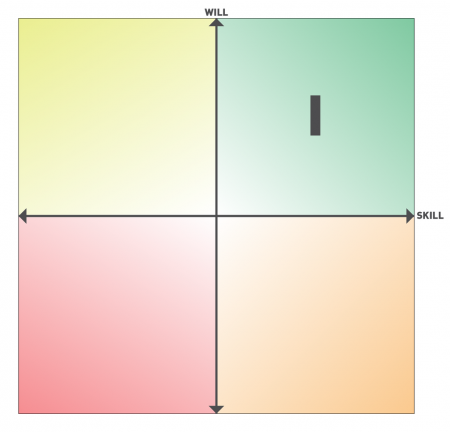
You’ll find your high-skill, high-will Quadrant I salespeople at the top of the leaderboard. They’re organized, driven and perform above expectations — so the challenge isn’t getting them to perform, it’s keeping them on an upward trajectory.
You will recognize them by:
They exceed expectations regularly with the drive and persistence it takes to rally their teams and close business. They’re confident in their abilities, bring enthusiasm to the job and lead teams that consistently improve. They’ll voice ideas and opinions that help you, the VP, understand what’s happening in the field to inform your strategic decisions, and are motivated by increased responsibility and opportunities to lead.
Pros:
- Ambitious
- Skilled
- Confident
- Reliable
- Passionate
- Lead by example
Cons:
- Difficult to recruit & retain
Sales Quadrant II
The champ in training. Quadrant II is raw, but aspiring.
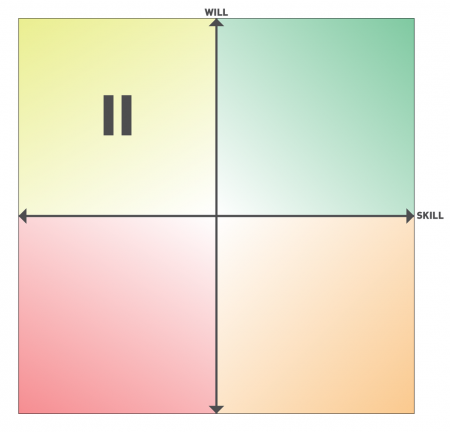
Quadrant II performers are sans Quadrant I skill, but are on the healthy side of the will spectrum, which means they have a high ceiling and over time will become more skilled. Look for them to be future QI sales leaders who can be a huge asset to your team, as long as you’re able to coach with some patience as they work their way over.
You will recognize them by:
Their confidence, persistence and tenacity to learn and succeed. Fast learners, Quadrant IIs will be the ones grinding hard, tapping mentors for tips and tricks of the trade, competing and putting in strong effort. Because they’re on the left of the skill axis, they still need refinement and aren’t ready to be superstars just yet. They struggle at tasks that require more experience or seasoning, but if you can afford to be patient with their development, they’ll grow into strong leaders.
Pros:
- Determination
- Passion
- Confidence
- Willingness to learn
Cons:
- Raw
- Inexperienced
- Works in progress
Sales Quadrant III
Lost in the woods. Quadrant III is overwhelmed and underperforming.
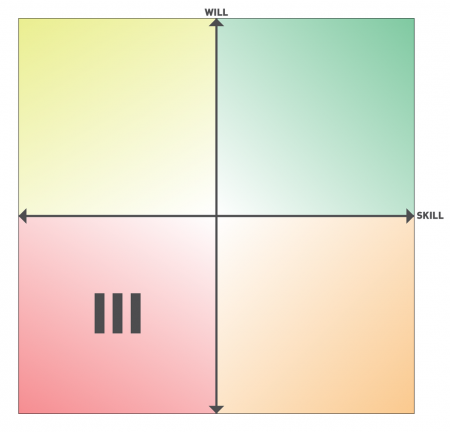
Quadrant III is a bad place to be. Most don’t start here unless it’s just a bad hire, but people can end up with major skill and will deficiencies due to poor fit or other adverse circumstances, like personal issues, distractions, or even just being burned out. It’s one thing to be lacking skill; it’s quite another to lack skill as well as the will to improve and overcome it.
You will recognize them by:
Lacking the fire to compete or the skill to pull the right levers, Quadrant IIIs are consistent under-performers. They’re different than QIIs in that you won’t see much progress or resolve to improve from QIIIs. They could be unhappy in their role or have other issues compelling them to the third quadrant.
Pros:
- None
Cons:
- Lack of passion
- Lack of skill
- Low morale
- Lack of competitiveness
Sales Quadrant IV
The bored doctor. A skilled tactician, but uninspired.

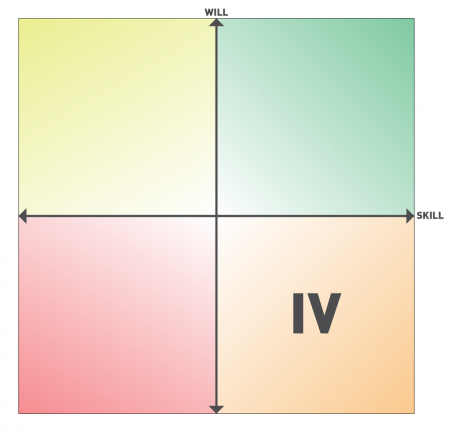
Quadrant IV sales managers possess the skills to be world-beaters, but lack the passion or willingness to be a champ. This could be due to a poor fit (i.e. not passionate about the product or industry) or other circumstances, because unless they’re a total natural, it generally takes strong will to develop high skill levels. If you can understand what drives them and motivate their willpower, they have the potential to be great, but even with such high skill levels, QIVs may underperform.
You will recognize them by:
A reactive versus proactive mindset. QIVs know their stuff, have solid experience and likely a track record of success, but they can settle for complacency when it comes to management and selling strategies. QIVs tend not to do the little things, but rather try to rely on their expertise to have success.
Pros:
- Knowledge
- Experience
- Competency
- Ability
Cons:
- Reactive instead of proactive
- Low motivation
Remember, people won’t always fall neatly into persona types. But by identifying the characteristics that influence skill and will, you can learn a lot about who you’re dealing with and what course of action is best to take in managing them. In the next post we’ll explore taking these characteristics into mind as you decide your team needs and coaching options, so that at the end of the day, you’ll have some helpful tactics for building your all-star sales team!

